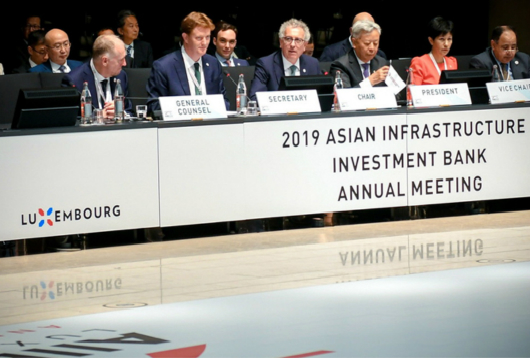
. > TOP STORIES
AIIB 2019 annual meeting wraps up
Author : Zhao Yuan Source : Chinese Social Sciences Today 2019-07-26

The fourth annual meeting of the Asian Infrastructure Investment Bank (AIIB) kicks off at the European Convention Centre in Luxembourg, July 12. Photo: IC
LONDON—The fourth annual meeting of the Asian Infrastructure Investment Bank (AIIB) Council closed in Luxembourg in mid-July. Under the theme “Cooperation and Connectivity,” this year’s annual meeting took place for the first time outside Asia.
The meeting highlighted stronger Asia-Europe cooperation and connectivity, digital connectivity, climate change, sustainable infrastructure and mobilizing finance for circular economy transitions.
The AIIB now has 100 approved members after its Board of Governors supported the applications of three African countries—Benin, Djibouti and Rwanda—during the meeting.
“AIIB members collectively account for 78% of the world’s population and 63% of global GDP. With the backing of all of our members, we are building a lean, clean and green institution that can help to support their sustainable development,” said AIIB President Jin Liqun. To date, 46 projects in 18 member countries totaling US$8.5 billion have been approved.
Pierre Gramegna, Luxembourg’s finance minister, asserted that the AIIB has earned the trust of the international community with high-quality and efficient operations, high standards of project evaluation and a high degree of social commitment. The AIIB focuses on climate change and environmental protection in its investment decisions, which will have a positive impact on future development. The Bank supports the rule-based international order, actively promotes mutual trust and cooperation among its members, and plays an important role in mobilizing private capital.
The 2018 AIIB Annual Report and Financials presents three main priority areas for investment and project selection: sustainable infrastructure with a focus on green investments, cross-border connectivity and private capital mobilization.
Simon Wilde, a research fellow at the Centre for Climate Finance and Investment at Imperial College Business School in the UK, said that the AIIB’s issuance of dollar-denominated green bonds reflects the Bank’s efforts to support green finance and the green bond market. Green bonds are bonds issued by governments, multilateral development banks and enterprises to raise funds for environmental protection projects, such as investment in wind farms, solar energy technology or more energy-efficient housing. There is still much room for improvement in the total volume of green bond issuance. By issuing its own green bonds, the AIIB helps other investors enter the green bond market and promotes the sustainable development of green finance.
The investment projects of the AIIB have brought development dividends to the countries involved. For example, the National Slum Upgrading Project in Indonesia has improved living conditions for local residents, and the Andhra Pradesh Urban Water Supply and Septage Management Improvement Project in India provides sustainable and safe drinking water for local residents.
Mohamed Maait, the Egyptian minister of finance, said that the huge gaps in infrastructure investment in Asia and Africa require multi-party cooperation to promote infrastructure upgrades and cross-border connectivity. For example, the Belt and Road initiative has increased connectivity among countries along the route. In the future, governments, multilateral development banks and international financial institutions will work together to fill the gap in financial investments in infrastructure, while mobilizing funds through demand mechanisms to facilitate sustainable development.
Indranee Rajah, second minister for finance and second minister for education of Singapore, said that infrastructure investment can improve people’s livelihood and lay the foundation for inclusive economic growth. The rapidly growing population and the increasing density of urban populations in Asia have made infrastructure construction an urgent problem. Infrastructure construction projects can be structured to enhance financing capabilities and improve the feasibility of obtaining investment and financing support.
Indranee said that as the AIIB enters a new stage of development, it will need to continue to strengthen its role not only as a financial services institution but also as a knowledge dissemination agency to serve the stakeholders in the infrastructure value chain. In terms of knowledge dissemination, the AIIB can achieve its goals by strengthening mutually beneficial cooperation with other multilateral development banks, deepening cooperation with governments in a more systematic way and mobilizing private capital more effectively.
Ye Shengtao made Chinese fairy tales from a wilderness
Ye Shengtao (1894–1988) created the first collection of fairy tales in the history of Chinese children’s literature...
-
How northern ethnicities integrated into Chinese nation
2023-09-18
-
Mogao caves
2023-09-12
-
Mogao Grottoes as ‘a place of pilgrimage’
2023-09-12
-
Time-honored architectural traditions in China
2023-08-29
-
Disentangling the civilizational evolution of China
2023-08-28
-
AI ethics in science fiction
2023-08-23













 2011-2013 by www.cssn.cn. All Rights Reserved
2011-2013 by www.cssn.cn. All Rights Reserved